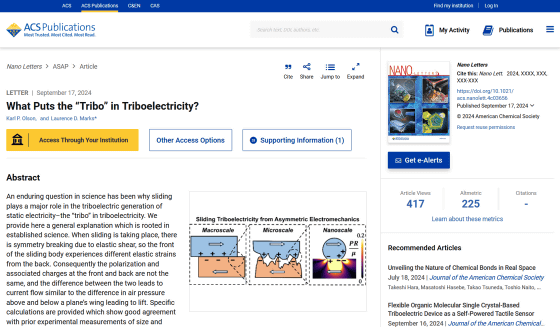The mechanism by which static electricity is generated when objects are rubbed together has finally been revealed

Around 600 BC, the ancient Greek philosopher
What Puts the “Tribo” in Triboelectricity? | Nano Letters
https://pubs.acs.org/doi/10.1021/acs.nanolett.4c03656

Why petting your cat leads to static electricity: For Journalists - Northwestern University
https://news.northwestern.edu/stories/2024/september/why-petting-your-cat-leads-to-static-electricity/?fj=1
We Finally Know What Creates Static Electricity, After Thousands of Years : ScienceAlert
https://www.sciencealert.com/we-finally-know-what-creates-static-electricity-after-thousands-of-years
Static electricity is something we are all familiar with, and many of us have probably experienced as children rubbing a paperweight against something and making our hair stand on end. When two different types of materials are rubbed together, a charge is transferred from one to the other, generating electricity. This phenomenon is called frictional electrification.
The existence of triboelectricity itself has been known since Thales' time, but there was no explanation for its specific mechanism. 'Since Thales, it has become clear that friction can cause static electricity to build up in all insulators, not just fur. But the scientific consensus has more or less stopped there,' says Lawrence Marks , professor emeritus at the School of Engineering at Northwestern University.
In a 2019 paper , Marks and his team discovered that rubbing two materials together deforms the tiny protrusions on their surfaces, and that this deformation generates a voltage.

Now, in a new paper, Marks and his team have explained the phenomenon in more detail: 'In 2019, we had the seed to understand what was going on, but like all seeds, it needed time to grow. Now that seed has blossomed. We developed a new model to calculate the current, and the values of the current in different cases matched well with the experimental results,' Marks said.
At the heart of their new model is the concept of 'elastic shear,' the ability of an object to resist strain as it slides. Shear elasticity is what causes a tray or book to slide across a table and then stop moving as soon as you let go.
When two materials are rubbed together, shear elasticity creates different elastic strains on the front and back sides of the materials, which results in different polarizations and associated charges, which then cause an electric current to flow, the researchers explain. While this model doesn't explain all aspects of triboelectricity, it does solve the main problem.
'For the first time, we have solved a mystery that no one has been able to explain before: why rubbing objects is important,' said Marks. 'People have tried and failed to explain experimental results without justifiable hypotheses. The answer is surprisingly simple: the front and back of the object being rubbed deform and have different charges, and an electric current flows through them.'

Static electricity is a familiar phenomenon that can be used for fun, such as flipping your hair over with a paperweight, but it can also cause industrial fires and explosions, as well as interfere with the application of powdered medicines. By better understanding the mechanisms behind static electricity, researchers may be able to come up with new ways to solve these problems.
'Static electricity affects our lives in ways both simple and profound,' Marks said. 'For example, electrostatic charging of particles affects how coffee beans are ground and how they taste. And without the crucial step of particles colliding with each other and becoming planets, Earth probably wouldn't be a planet. It's amazing how much of our lives are touched by static electricity, and how much of the universe depends on it.'
◆ Forum is currently open
A forum related to this article has been set up on the official GIGAZINE Discord server . Anyone can post freely, so please feel free to comment! If you do not have a Discord account, please refer to the account creation procedure article to create an account!
• Discord | 'Are you doing anything to prevent static electricity?' | GIGAZINE
https://discord.com/channels/1037961069903216680/1288790754956808203
Related Posts:
in Science, Posted by log1h_ik







